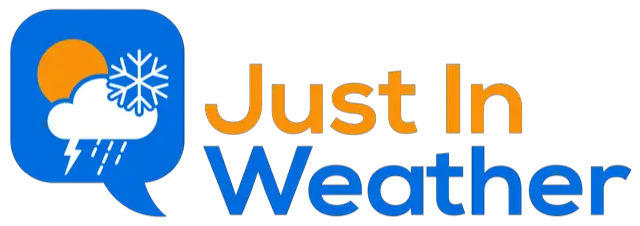Winter Weather From Woolly Bear Caterpillars: Can Stripes Foretell Snow?
October 5, 2023
The months of October and November are our transition through Fall, and each cold air outbreak brings the question of what the winter ahead may bring. It can also bring out a familiar pastime of observing Woolly Bear Caterpillars. These may also be known locally as Fuzzy Bears or Woolly Worms. It has even been called a Hedgehog Caterpillar because it curls up into a ball for protection and plays dead.
The reality is that this creature is in the early phase of the life cycle of what will become a tiger moth.
In this report, I want to share with you the folklore and reality about the Woolly Bears, and I need to be completely authentic in my experience. I do love snow and always have Faith in the Flakes (FITF), but I also need to be practical.
This first photo is what I saw on my driveway yesterday. A classic black and brown striped worm.
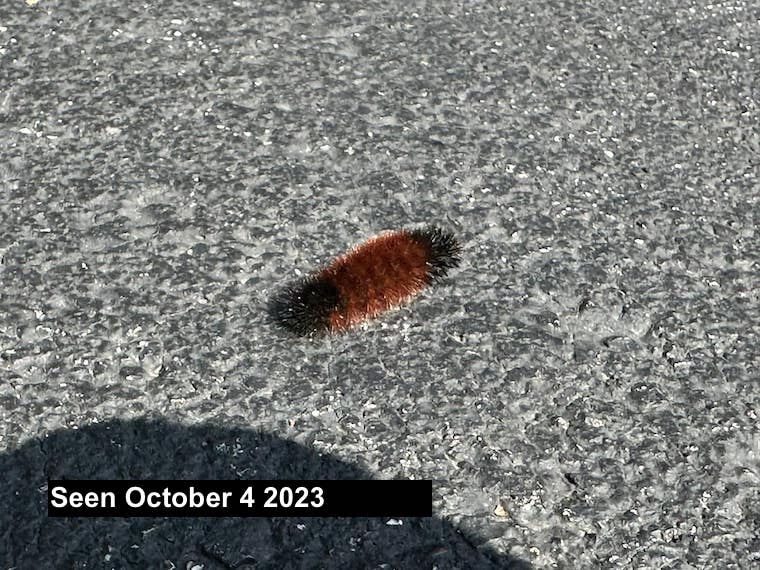
This next photo was also seen on my driveway with my cat. He did NOT eat it!
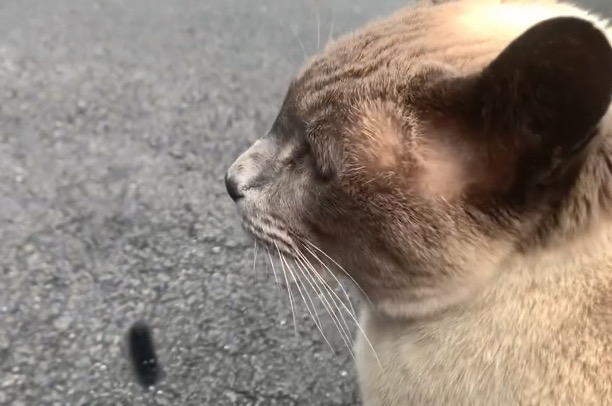
This one was ALL BLACK. As the folklore or myth suggests, that would bring a very harsh and snowy winter. Below, I will show the video of this event and the year it was recorded. The following winter may add some more insight into using this method.
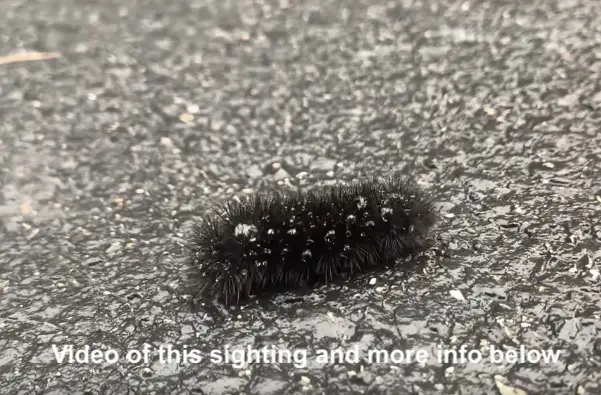
Woolly Bear Folklore
The wider the brown (middle) band on a woolly bear caterpillar, the milder the winter?
Two ways to look at them:
- The Orange Band: This stripe in the middle will be wider when the upcoming winter is expected to be mild.
- The Black Bands: The thicker or more dominant these are means a longer and harsher winter ahead. Translation: More cold and snow!
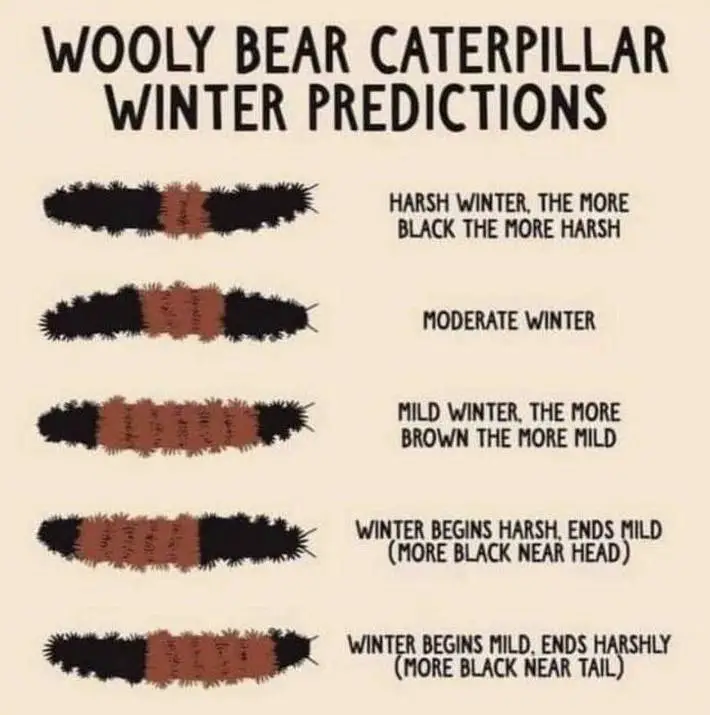
What determines the colors?
The bands are determined by how long the caterpillar has been feeding, age, and species.
A better growing season means it ate more. The result is a larger caterpillar and a smaller orange band. So, the color actually shows the prior growing season. However, there is some winter weather folklore that would correlate the summer season and cross to winter snow, so there still could be a connection.
Also:
The caterpillar can molt or shed its skin up to 6 times, each one getting a little more orange.
There are 260 known species of tiger moths.
But what about an all-black caterpillar?
Does that mean we are in for a Polar Vortex followed by Ice Age conditions? Faith in the Flakes! I’ve even seen a few all light brown or blonde. Would that mean a snow-free winter?
Comparing Caterpillars: DIFFERENT SPECIES
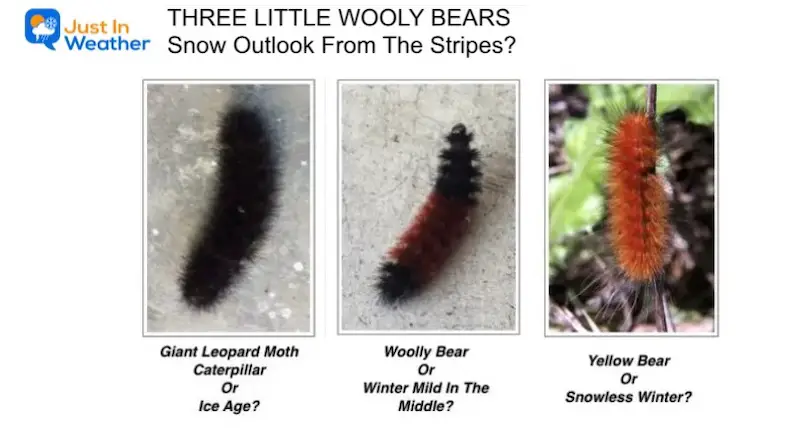
Lighter color: Yellow Bear (Spilosoma virginica). These turn into a Virginian Tiger Moth
The striped caterpillars or classic Woolly Bears (Pyrrharctia isabella) turn into a Tiger Moth
The all black caterpillars (Hypercompe scribonia) turn into a Giant Leopard Moth
If we ‘follow the science’, the relative width of the black band varies with age, and has nothing whatsoever to do with weather (Wagner 2005).
But wait! Mike Peters, an entomologist at the University of Massachusetts, says there could, in fact, be a link between winter severity and the brown band of a woolly bear caterpillar. The width of the brown band does say something about a heavy winter or an early spring. That is winter and spring, the previous year, when the caterpillar started crawling.
Note: These caterpillars can survive through the winter, producing their own antifreeze.
If we want to stick with the folklore, then here is a more elaborate breakdown of color patterns and winter.
Video: All Black/No Orange Stripe
About that ALL BLACK caterpillar I recorded… Here is the video I posted on Facebook.
It was October of 2022. That was LAST YEAR! I don’t think I need to remind fellow snow lovers that this was THE LOWEST snowfall year in the Mid-Atlantic on record since 1880.
FITF Fans: Does this mean a very harsh winter ahead? I am sorry to say this is NOT hard proof.
Other All Black Worms
Deb Foster captured this in Taneytown, Maryland.
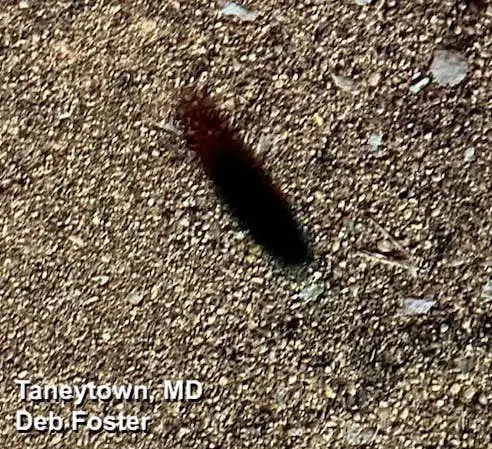
Nicole Lee captured this in Chester County, PA, last week.
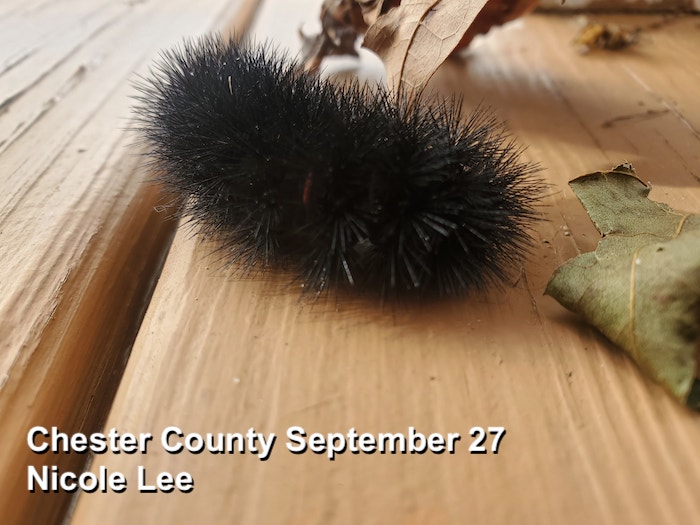
As excited as I would like to be as well, I must exercise caution relating this to a harsh winter. It is likely just a different type of worm.
History Of Celebrations
From the National Weather Service Archives:
The popularity of the woolly bear caterpillar has resulted in several festivals honoring them. Since 1973, the residents of Vermilion, Ohio have held an annual “Woolly Bear Festival“. The festival is the brainchild of legendary Cleveland TV personality Dick Goddard, a longtime weatherman at WJW-TV. It is claimed to be the largest one-day festival in Ohio. Festivities include a parade, woolly bear races, and an “official” analysis of the woolly bears and forecast for the coming winter.
Also, every 3rd weekend in October, the annual Woolly Worm Festival is held in Banner Elk, NC. They begin their worm races around 10:20 AM, or as soon as the first heat, on Saturday morning. Races continue all day until the grand final about 4 PM when the champion worm and trainer is crowned (and paid!). At that time, the official winter forecast will be declared. Sunday worm races are for fun and small prizes and will continue throughout the day as long as there are race participants.
Other festivals are held in Beattyville, KY (began in 1987); Lewisburg, PA (began in 1997); Oil City; PA (began in 2008); and Lion’s Head, Ontario (began in 2011).
…One of the few things you won’t need pest control for!
Weather posts straight to your inbox
Sign up and be the first to know!
Other Recent Winter Reports:
Winter Outlook 2024 From Two Farmers Almanacs
El Niño Advisory: First Look At NOAA’s Winter Outlook Expectations Return to Cold and Snow
EXPLORE MORE
Winter Weather Folklore: Top 20 and More
Subscribe for eMail Alerts
Weather posts straight to your inbox
Sign up and be the first to know!
Please share your thoughts and best weather pics/videos, or just keep in touch via social media
-
Facebook: Justin Berk, Meteorologist
-
Twitter
-
Instagram
RESTATING MY MESSAGE ABOUT DYSLEXIA
I am aware there are some spelling and grammar typos and occasional other glitches. I take responsibility for my mistakes and even the computer glitches I may miss. I have made a few public statements over the years, but if you are new here, you may have missed it: I have dyslexia and found out during my second year at Cornell University. It didn’t stop me from getting my meteorology degree and being the first to get the AMS CBM in the Baltimore/Washington region. One of my professors told me that I had made it that far without knowing and to not let it be a crutch going forward. That was Mark Wysocki, and he was absolutely correct! I do miss my mistakes in my own proofreading. The autocorrect spell check on my computer sometimes does an injustice to make it worse. I also can make mistakes in forecasting. No one is perfect at predicting the future. All of the maps and information are accurate. The ‘wordy’ stuff can get sticky. There has been no editor who can check my work when I need it and have it ready to send out in a newsworthy timeline. Barbara Werner is a member of the web team that helps me maintain this site. She has taken it upon herself to edit typos when she is available. That could be AFTER you read this. I accept this and perhaps proves what you read is really from me… It’s part of my charm.
#FITF



